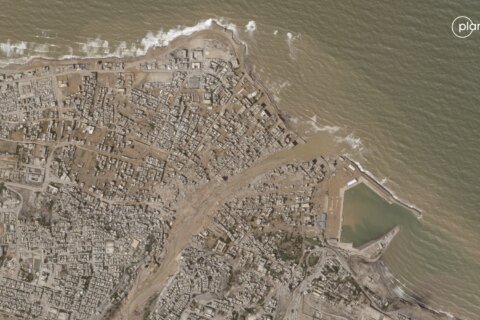NAIROBI, Kenya (AP) — Ethiopia’s government has issued a new order aiming to restrict media reporting of the country’s yearlong war, prohibiting the sharing of non-official information on “military-related movements, battlefront results and situations.”
The statement released late Thursday, which applies to everyone in the country, also warns that “supporting the (rival Tigray forces) directly or indirectly in the name of freedom of speech should cease immediately.” And it strongly warned against calls for the formation of a transitional government.
Security forces will “take measures” against violators, it said, but didn’t elaborate.
Ethiopia’s government this month declared a state of emergency as fighters from the country’s northern Tigray region, in collaboration with fighters with the Oromo Liberation Army, approached the capital, Addis Ababa. The United States and other governments have been urging their citizens to leave immediately.
Tens of thousands of people have been killed in the war that erupted in November 2020 between Ethiopian forces and the Tigray forces who had long dominated the national government before Prime Minister Abiy Ahmed took office in 2018. Foreign media have been barred from Tigray for much of the war, with communications links severed, and both local and foreign journalists have been intimidated and harassed.
In his latest attempt to rally all able Ethiopians to fight what he now calls an “existential war,” the 45-year-old prime minister this week announced that he would go to the battlefront to direct the army, a dramatic move two years after receiving the Nobel Peace Prize.
Mediation efforts by the U.S. and African Union in pursuit of a cease-fire and talks have made little apparent progress. The war in which witnesses have described gang-rapes, mass expulsions and deliberate starvation has seen atrocities committed by all sides, though Ethiopian forces and their allies from neighboring Eritrea have been blamed for most of the abuses.
The war has created a huge humanitarian crisis in Africa’s second most populous country, with some 6 million people in the Tigray region under a months-long government blockade. Many in the neighboring Amhara and Afar regions remain beyond the reach of aid as the Tigray forces fight their way toward Ethiopia’s capital. They say they are pressuring the government to lift the blockade but also have warned they want Abiy out, by force if needed.
“Today, 9.4 million people are living their worst nightmare” in northern Ethiopia, World Food Program spokesman Tomson Phiri told reporters in Geneva on Friday.
The United Nations agency also said 35 aid trucks had arrived in the Tigray capital, the first such aid to arrive in the region since Oct. 18, when Ethiopia’s military resumed airstrikes against the regional capital. Some 100 aid trucks are needed each day to meet the urgent needs in Tigray, the U.N. has said.
Copyright © 2024 The Associated Press. All rights reserved. This material may not be published, broadcast, written or redistributed.







